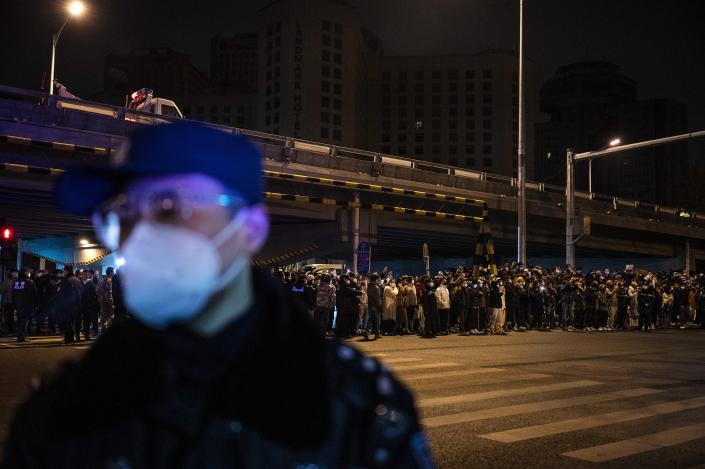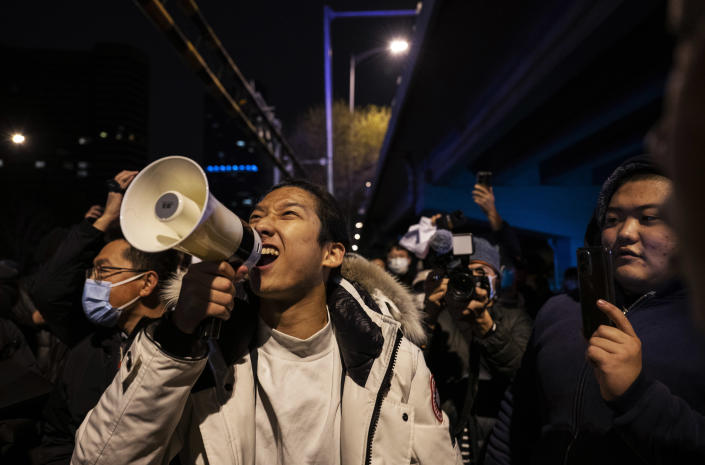HONG KONG — Protesters increasingly fed up with Chinese President Xi Jinping’s “zero-Covid” restrictions rallied in cities across the country over the weekend, in a widespread show of resistance to Communist Party rule that has not been seen in decades.
Crowds in some of China’s biggest cities, angered by a deadly fire in the western Xinjiang region that they said was made worse by Covid restrictions, blocked roads, chanted slogans and clashed with security personnel, who made multiple arrests.
Many protesters carried candles, flowers and signs to mourn the victims of the fire, which killed at least 10 people. In the financial hub of Shanghai, which endured a grueling two-month lockdown earlier this year, video showed people being dragged, beaten and pinned to the ground by police as they protested on Urumqi Road, named for the Xinjiang capital where the fire took place.
Lesley, a 28-year-old digital editor who attended the Shanghai protest Sunday, said she was deeply moved by the courage of her fellow protesters, who she said were mostly young and tried to stay peaceful. But they were also inexperienced and the protest was unlikely to be successful, said Lesley, who asked to be referred to only by her first name for fear of arrest or retaliation.
“I think what was so valuable about this protest was that it gave me a sense of courage and strength that I hadn’t felt in a long time, and it also made young people who speak up feel that they were not alone,” she told NBC News via Xiaohongshu, China’s version of Instagram. “We were connected from an online isolated island to a real community.”


Some protests that began with demands to be freed from Covid restrictions intensified into calls for more rights and freedoms in general and even for Xi to step down. In the capital, Beijing, students at Tsinghua, one of China’s most prestigious universities and Xi’s alma mater, shouted “We want democratic rule of law, we want freedom of speech.”
Experts say the current size and scale of the protests are unlikely to pose a real threat to Xi, who gained a historic third term in office last month at the Communist Party congress. Stronger than ever after a decade in power and now surrounded exclusively by loyalists, Xi is China’s most dominant leader since Mao Zedong.
After a tumultuous weekend, the protests appeared to have died down by Monday. In Shanghai, blue barriers were erected on Urumqi Road, where there was a heavy police presence.
But public frustration with China’s “dynamic zero-Covid” policy has been mounting in recent months, said Jean-Pierre Cabestan, a professor of government and international studies at Hong Kong Baptist University. Though officials have eased quarantine and testing requirements, China is also reporting record virus cases, making further lockdowns likely.
The chasm between life in China versus the rest of the world has only become more noticeable as Chinese soccer fans tuning into the World Cup comment on the maskless crowds in the stands.
“At the beginning, people [were] quite happy with the way Xi Jinping took leadership in fighting the Covid-19 pandemic,” Cabestan said, “and the government’s propaganda has been pretty efficient in demonstrating that China was doing better than the rest of the world in limiting the number of fatalities. But now it has backfired.”


Asked about the protests Monday, Foreign Ministry spokesman Zhao Lijian said the Chinese government was adjusting its Covid measures based on the realities on the ground.
“We believe that with the leadership of the Communist Party of China and the support of the Chinese people, our fight against Covid-19 will be successful,” he said at a regular news briefing.
Zhao also addressed the detention of BBC journalist Ed Lawrence, who was arrested Sunday while covering the protests in Shanghai. In a statement, the broadcaster said Lawrence was beaten and kicked by police during his arrest, then held for several hours before being released. A video showed him instructing someone nearby to call the British Consulate as he was taken away.
Zhao disputed the BBC’s version of events, saying Lawrence did not identify himself as a journalist before his arrest.
“Local law enforcement officials were persuading people at the scene to leave, and those who refused to cooperate were then ushered away,” he said.
The Foreign Correspondents’ Club of China said in a statement Monday that journalists from multiple outlets were physically harassed by police while covering the protests, and that at least one other journalist was detained.
Victor Gao, a prominent political affairs analyst with strong links to the Communist Party, said authorities need to take the protests “seriously and really take effective measures to address the underlying legitimate concerns by those protesters.”
But he downplayed the anti-government slogans chanted by some of the protesters, saying they were not representative of the majority view in China.
“After the 20th Party Congress, China is as united as you can expect of any country,” said Gao, who served as a translator for the Chinese leader Deng Xiaoping.
Officials have shown some response to the protesters’ demands, relaxing restrictions in cities like Beijing. That may be enough to satisfy most people, said Zhan Jing, a professor of government and public administration at the Chinese University of Hong Kong.
The Communist Party “has a lot of experience accumulated over the years in dissipating social unrest,” she said. Local governments are drawing up plans and visiting communities to hear their concerns, she said: “Although we may not directly observe them, they are doing things.”
The unrest began Friday with a protest in Urumqi over the fire at a high-rise apartment building the night before. A Covid lockdown has confined many of the city’s 4 million residents to their homes for more than three months, and there was widespread belief that locked doors and other measures hindered residents’ escape, as well as firefighters’ efforts to extinguish the blaze. NBC News could not confirm whether or not Covid restrictions influenced the response to the fire.
Though officials denied this, they further fanned public anger when they made comments suggesting that residents should have tried harder to save themselves.
The protest was all the more notable because it took place in Xinjiang, where the Chinese government denies accusations of human rights abuses against the mostly Muslim Uyghur ethnic group. Most of the people who protested appeared to be from the Han ethnic group that dominates China.


Officials said Saturday that restrictions in parts of Xinjiang, including Urumqi, would be eased. But the tragedy struck a nerve with others who have been in lockdowns across China, who saw it as something that could just as easily have happened to them.
Francis, a graduate student in the southwestern city of Chengdu, said he was eating at a hot pot restaurant on Wangping Street on Sunday when he heard chants outside of “We don’t want nucleic acid testing, we want freedom!” A video posted online and verified by NBC News showed other protesters in Chengdu chanting “freedom of speech” and “freedom of the press.”
Seeing no move by police to disperse the relatively mild crowd, he and his friend followed it, said Francis, 23, who also asked to be identified only by his first name. He said some protesters held up blank sheets of paper, a silent form of protest used to evade censorship, while others lit candles.
“My feeling in this protest is that everyone is dissatisfied with the Covid prevention policy, less about expressing their anger” toward the Chinese Communist Party, he said.
For hundreds of millions of Chinese, zero-Covid measures have meant restrictions on travel, sometimes daily testing and the constant threat that they will be sent to government quarantine facilities or thrown into sudden lockdown. Those in lockdown have complained about lack of access to food and medicine, and the public has been outraged by the non-Covid-related deaths of people, including children, whose treatment was allegedly delayed by restrictions.
Though many people in China continue to support zero-Covid measures, the policies have also fueled growing resentment especially when combined with other grievances. Violent protests broke out last week near a factory in Zhengzhou that is the primary assembly site for Apple’s iPhone 14, where production has been slowed by the handling of a Covid outbreak, a labor shortage and disputes over pay.
Mindful of the growing public frustration and economic cost, Chinese officials announced an easing of quarantine and other measures earlier this month. But they emphasized that China was not abandoning zero-Covid, and restrictions quickly snapped back into place as the number of virus cases surged.


China’s National Health Commission reported 40,052 new cases nationwide Monday, setting a record for the fifth day in a row. That is about the same number of cases being reported daily in the United States, which has a quarter of China’s population.
The Chinese government says it is saving lives with its zero-Covid strategy, arguing that it shows the superiority of Communist rule. While the U.S. has recorded more than a million virus deaths, the official toll in China is 5,232, a number that could rise exponentially if the fragile health care system is overwhelmed with virus cases.
The Chinese government’s success in minimizing the loss of life “is something to be acknowledged and to be credited,” Gao said. “No country in the world can do what China is doing.”
But China faces a “very painful” transition, Gao said, as it tries to minimize Covid deaths and infections while also keeping life as normal as possible. In addition to making anti-Covid measures more scientific and precise, Gao said, the Chinese government also needs to focus on increasing the vaccination rate, especially among older people.
“This is the time for all of us in China to really help out to overcome the difficulties and move in the right direction,” he said.
This article was originally published on NBCNews.com




